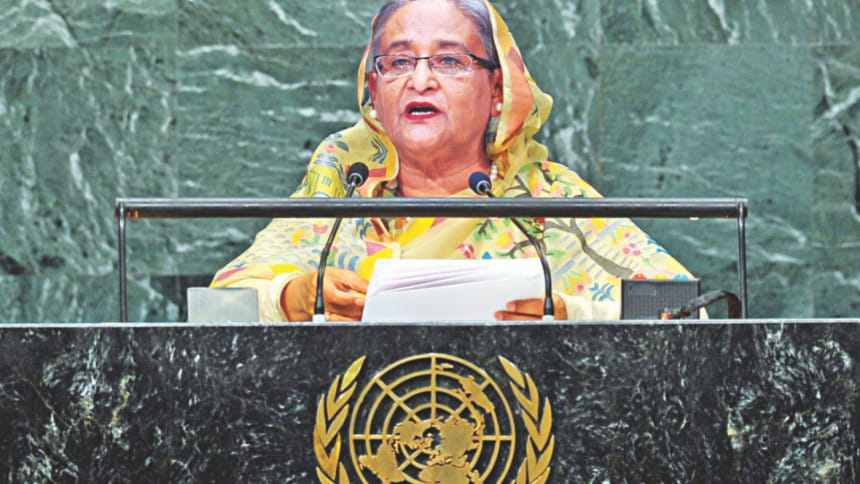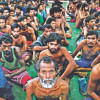Work together to root out terrorism

Prime Minister Sheikh Hasina has called upon the world community to work together to root out militancy and terrorism, and plug the sources of funds, arms and ammunitions across borders.
“Terrorists have no religion, caste or creed. We must unite in our resolve to defeat and degrade them in all forms and manifestations. We have to identify the root causes of terrorism and violent extremism,” she said.
The PM was addressing the 71st session of the UN General Assembly (UNGA) here on Wednesday.
Like the previous years, she delivered her speech in Bangla.
READ: Prime Minister Sheikh Hasina awarded for women empowerment
Hasina mentioned that last year she talked about terrorism and violent extremism as one of the two major global challenges of the time.
“We see these menaces sweeping across borders. No country seems immune... no individual is beyond their target. The terrorists are killing many innocent people everywhere, from the USA to Europe, Africa to Asia,” she added.
She stressed the need for finding out the mentors, masterminds, abettors, financiers, arms suppliers and trainers of the terrorists and extremists, and taking stern action against them.
“As a victim of terrorist attacks, I myself have a 'zero tolerance' approach to terrorism and violent extremism. Our government did succeed in disintegrating the home-grown terrorist groups, plugging their regular financing pipelines, and flushing out the regional operatives from our territory.”
With the rise of certain international terrorist entities, it appears some of the local fringe elements have drawn inspiration and managed to regroup and rebrand themselves, the PM said.
“Bangladesh, a unique country of religious harmony, experienced a grisly attack on July 1 when home-grown terrorists killed 20 people at a Dhaka restaurant. We had been able to rescue 13 hostages unhurt. The horrific incident imprinted a deep scar on the hearts of Bangladeshi people.”
Hasina urged world leaders to find common grounds in the interest of mankind to end the ongoing global disorder to take forward the world towards peace and prosperity.
Terming the UN a unique platform to do so, she said: “Let us renew our resolve to create an organisation of enduring relevance.”
Reiterating Bangladesh's firm commitment to global peace, she said the country would carry on promoting a culture of peace.
In her 19-minute speech, the premier highlighted Bangladesh's socioeconomic development, current political situation and the government's stride to combat terrorism and militancy.
About the Sustainable Development Goals (SDGs), she said political will behind the agenda needs to be translated into concrete and meaningful support for countries that are lagging behind.
She called for fulfilling the internationally agreed development commitments for the Least Developed Countries to pave the way for their progress. The Technology Bank for LDCs should be geared at promoting innovation and predictable resource flow, she observed.
In Bangladesh, she said, the government has already included most SDGs into the national development plans. A platform under her supervision has been created to coordinate and monitor the work. Consultations are going on with local governments, civil society, media and academia.
She said Bangladesh has experienced one of the fastest poverty reduction rates in the world with a modest resource base. “We've brought down poverty from 56.7 percent in 1991 to 22.4 percent today. We've already graduated from the UNDP's low human development category to medium, and the World Bank's lower-middle income status.”
Despite global recession, the export earnings grew by more than three times to $34.24 billion; remittance flow increased nearly three times; and foreign currency reserve jumped by 8.5 times from $3.5 billion to over $31 billion over the last seven years, she mentioned.
During the same period, the country's power generation capacity increased nearly threefold and foreign direct investment also rose by three times.
“A key to our development strategy is our focus on addressing inequality through social security, decent work and financial inclusion. We allocate over 13 percent of our budget to social safety net spending, which is 2.3 percent of our GDP,” the premier told the UNGA.
But the climate change threatens many of the country's development gains, said Hasina.
The landmark Paris Climate Agreement recognises the importance of adaptation, loss and damage, and climate justice, said the PM, adding that her cabinet ratified the agreement. She hoped the large carbon emitting countries would ratify the deal soon.
About her government's aim to build an inclusive, empowered, digital and knowledge-based society, Hasina said the Bangladesh government was focusing on innovative public service delivery, mass access to information and enhanced transparency and accountability.
She said the government has set up about 10,000 digital centres across the country to cater 200 different services to people's doorsteps. Health services through mobile phones and a web portal are complementing the work of 16,438 community and local health clinics while digital labs and multimedia classrooms are operating in growing number of educational institutions.
She proposed extending this connectivity to every citizen of the world by 2030.
The PM said Bangladesh's strategic location has made it an emerging hub for regional connectivity, foreign investment and global outsourcing. Besides, the government has embarked on large-scale infrastructure projects to match the country's development aspirations.
Multimodal transport networks are being built to promote trade and people-to-people contacts among Bangladesh, Bhutan, India and Nepal. The work of the 6.15km Padma Bridge has been commissioned with the country's own resources, she added.
She told the UN that discussions were underway to build a deep sea port, while the third seaport in Payra commenced operations. The work on the metro rail project in Dhaka city was also going on. A total of 100 economic zones were being set up across the country to allow potential investors to invest in Bangladesh.
Such forward-looking thrust in Bangladesh's progress was supported by the country's impressive macro- and socioeconomic records. In 2015-2016 fiscal year, the country's economy posted a GDP growth rate of over 7 percent, she pointed out.
Stressing the importance of women empowerment, the premier said sustainable development would not be tenable without women's participation.
In Bangladesh, she said, a host of measures, including promotion of girls' education, undertaken half a decade ago, started yielding dividends. Women are increasingly becoming an integral part of the country's development endeavours.
About ensuring accountability and justice for mass atrocities, she said the country shall remain vocal about recognising the role of national judicial processes in this regard.
“We have moved past decades of impunity to ensure the trial of local perpetrators of genocide and crimes against humanity during our Liberation War in 1971.”
Hasina said the recent efforts to resume the Middle East Peace Process and end the hostilities against the Palestinian people must be pursued in the right direction.
She congratulated Peter Thomson as the president of the 71st session of the UNGA and commended his predecessor Mogens Lykketoft for his dynamic role.
The PM also remembered the contributions of outgoing UN Secretary-General Ban Ki-moon, terming him a true and trusted friend of Bangladesh.
Presidents of Croatia and Sri Lanka Kolinda Grabar-Kitarovic and Maithripala Sirisena; prime ministers of Romania, Georgia and Australia Dacian Julien Cioloş, Giorgi Kvirikashvili, and Malcolm Turnbull, among others, took part in the discussion in the evening session.

 For all latest news, follow The Daily Star's Google News channel.
For all latest news, follow The Daily Star's Google News channel. 




Comments